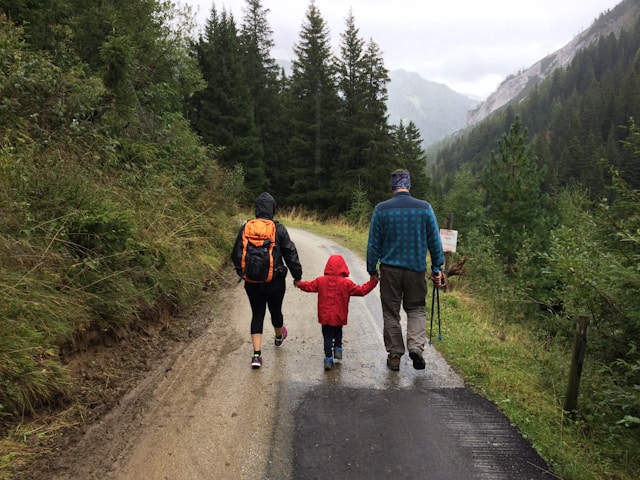Helping children adjust during family immigration changes
- Mums Tips
- Published on Monday, 11 August 2025 14:10
- Last Updated on 12 August 2025
- Monica Costa
- 0 Comments
Relocating to a new country can be an exciting chapter for the whole family, but for children, the changes can feel overwhelming. They are often leaving behind familiar places, friends, and routines. This can be a time of mixed emotions, where curiosity about the new environment blends with uncertainty about what lies ahead. Parents have the added challenge of managing both the legal aspects of immigration and the emotional needs of their children, making it essential to approach the process with patience and preparation.

The Emotional Impact of Immigration Changes on Children
When families move abroad, children may experience a variety of emotional responses that can affect their sense of stability. A sudden change in environment, school, or social group can trigger feelings of loss, anxiety, or frustration. Younger children might show signs of clinginess or changes in sleeping patterns, while school-aged children may be more concerned about making friends and fitting in. Teenagers can react strongly to being uprooted, sometimes resisting the move altogether.
Parents should remain observant for behavioural and physical changes such as alterations in appetite, difficulty sleeping, or withdrawal from family activities. These signs can indicate that a child is struggling to process the move. Recognising these cues early allows parents to take steps that support emotional adjustment.
Practical Strategies for Supporting Children Through Immigration Transitions
Establishing familiar routines can be one of the most effective ways to help children feel secure. Mealtimes, bedtime rituals, and family activities from their previous home can provide a sense of continuity. This consistency helps children feel anchored, even in an unfamiliar setting.
Open communication is equally important. For younger children, parents might use stories, drawings, or picture books about moving to help explain the changes. Older children may prefer more detailed conversations about their new school, neighbourhood, or activities they can look forward to.
Keeping cultural traditions alive in the new country can help children maintain a connection to their heritage. Regularly celebrating familiar holidays, cooking traditional meals, and keeping in touch with extended family can make the transition less daunting.
Building a Support Network in Your New Community
Settling into a new country can be easier when families have a strong network around them. Many cities offer parent groups and community organisations that bring together immigrant families. These groups provide practical information and create opportunities for children to meet peers who have undergone similar changes.
Cultural centres and associations are also valuable for maintaining a sense of identity. Through language classes, cultural events, or community projects, children can feel proud of their background while becoming part of their new community.
Seeking family-focused immigration advice from Kadmos Consultants can also help families in more ways than just handling the visa process. An experienced immigration consultant can guide parents through legal requirements and the practical steps of settling into a supportive community.
Navigating School Transitions During Immigration Changes
Education is a central part of a child’s adjustment. Understanding the UK’s school admission process before arrival can help parents secure a place quickly. Required documentation often includes proof of address, a birth certificate, a passport, and previous school records. Having these prepared in advance prevents delays.
Children may take time to adapt academically, especially if they are moving into a different curriculum or learning in a new language. Parents can work closely with teachers to identify areas for extra support. Schools often provide English language assistance, but parents can reinforce this learning at home through reading, games, and conversation in English.
At the same time, it is beneficial to continue developing the child’s first language. This supports their overall learning and helps them maintain cultural ties and communicate effectively with extended family.
Legal Considerations for Children in UK Immigration Processes
The UK immigration system has specific provisions for children; parents need to be aware of these when planning a move. The principle of acting in the “best interests of the child” means that immigration decisions must consider a child’s welfare and family connections.
Documents such as birth certificates, passports, and school records are often required when preparing applications. If the child’s surname differs from the parent’s, additional proof of relationship may be needed. An immigration lawyer or experienced immigration solicitors can help ensure all paperwork is correct and complete, reducing the risk of delays or refusals.
Essential Documents for Children’s Immigration Applications
Parents should gather all necessary documents well in advance. These typically include a child’s full birth certificate, translated into English if required, and a valid passport with sufficient remaining validity. Where applicable, previous visas and academic records should be included.
Medical records, including vaccination history, and documents proving the parent-child relationship are important. If one parent is not moving to the UK, a consent letter from the non-moving parent is generally required. Recent passport-sized photographs that meet UK visa standards should be submitted.
Proof of suitable accommodation in the UK is also essential. Depending on the type of visa, evidence of English language ability may be required for older children. Working with an immigration consultant can make gathering and organising these documents more efficient.
Supporting Emotional Wellbeing Throughout the Move
While legal and practical steps are critical, ensuring that children’s emotional needs are met is equally important. Encouraging them to share their feelings, validating their concerns, and involving them in decisions where appropriate can help them feel more in control.
Simple activities such as exploring the new neighbourhood together, finding local parks, or enroling them in extracurricular activities can help them settle more quickly. Connecting with other families, both local and from similar backgrounds, can give children a sense of belonging.
Long-Term Adjustment and Planning Ahead
Even after the initial move, children may take months or even years to feel fully settled. Parents should continue to monitor their adjustment and provide reassurance during challenging moments. This includes preparing them for key milestones such as starting a new school year or moving to a different area.
Maintaining contact with extended family, supporting both languages spoken at home, and staying involved in school activities can all help children build a strong foundation in their new environment. Legal processes, such as extending visas or applying for settlement, should also be planned well ahead, ideally with the help of qualified immigration solicitors.
Moving to a new country with children is a major life change that requires both practical organisation and emotional preparation. From securing the right documents to finding the right school and helping your child adapt socially, every step makes the transition successful.

Monica Costa founded London Mums in September 2006 after her son Diego’s birth together with a group of mothers who felt the need of meeting up regularly to share the challenges and joys of motherhood in metropolitan and multicultural London. London Mums is the FREE and independent peer support group for mums and mumpreneurs based in London https://londonmumsmagazine.com and you can connect on Twitter @londonmums





